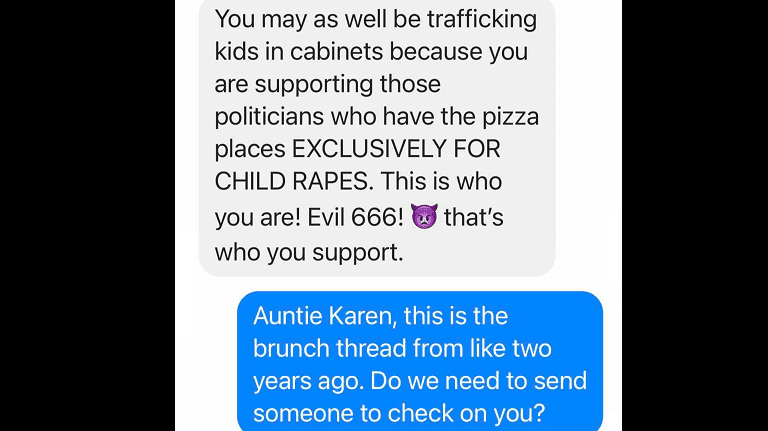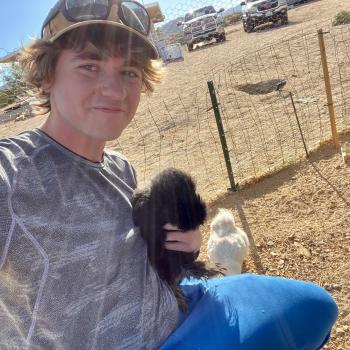If you’ve ever looked at a Qanon believer posting nonsense online and wondered how they could believe in such crazy things, we may be closer to an answer in some cases: good intentions. That’s what happened with Cindy Ramirez, who dipped her toes in the conspiracy waters not long ago.

Do you remember that time everyone thought Wayfair was not-so-covertly selling children through its filing cabinets? Well, that was when Cindy fell in with one part of the gospel of the online conspiracy vehicle “Qanon.” She saw what she thought was kids being taken advantage of, and she fought hard for them.
Cindy is consistently a powerhouse activist – especially on social media – always fighting for the rights of women, the LGBTQ+ community, and people of color. But not too long ago, she was also fighting the invisible world of powerful pedophiles, used by Q to distract followers from real issues, without even knowing it.
I spoke with Cindy to find out what brought her into the dangerous false narrative, how she escaped it, and what lessons she wants to pass on to others in her same position.
McAfee: Like many people, your introduction to Q was the Wayfair babies-in-cabinets stuff. Can you tell me how you learned about that and what happened next?
Ramirez: I first came across the Wayfair conspiracy in my true crime groups on Facebook. What intrigued me was the very unique names of missing children on the cabinets. So naturally, I went to Twitter to go find out more about what was going on and saw that it was trending. I took the screenshots that I could find and reposted them on my own Facebook page.
What happened next was that my friends who are mom’s shared my post to their mom groups, and it spread like wildfire after that. It was being shared into local community groups and church groups across the U.S., and later on to other countries. I started to get a lot of messages from random people about my post. They were telling me that what I was doing was important and that I should protect myself because the government was going to probably come and “get me” for posting that. I got so many Trump supporters in my personal messages thanking me for bringing this into the light, which was a big red flag to me. People were telling me I should go into hiding for “exposing” Wayfair.
As the post was going viral, I looked more into Q and realized how big of a mistake I had made in sharing their conspiracy, because I ended up becoming the messenger and exposed thousands of people to their ideology. My sister still to this day, is a very big Q supporter and it ultimately caused a rift between us when I tried to correct my mistake and reason with her, but she couldn’t be reasoned with at that point.
McAfee: I’m so sorry to hear about the situation with your sister. I’ve actually experienced something similar with my sister. Did she hear of Q independently or through you? And do you still try to talk sense into her from time to time?
Ramirez: She already had a basic framework of beliefs that follow closely with those of Q anon due to her religion, but was not aware she was spouting Q conspiracies. She had no previous knowledge of who Q was until I tried to inform her and reason with her. I made the mistake of reposting the Wayfair conspiracy, and I think that because we’re sisters it added legitimacy to the conspiracy, in her eyes.
I realized through my numerous attempts of talking with her that there was really nothing I could say that would help her to let go of those ideas. The Q conspiracies worked as a confirmation bias for her, and she only grew more insistent the more I tried to talk about it. So, I removed her from my life once she started idolizing Q. That, to me, was too far gone.
McAfee: I think conspiracy theories kind of feed each other, and that believing in one makes others easier to accept despite a glaring lack of evidence. Do you think the Wayfair conspiracy hooked a lot of people by getting them in on one that made it into the mainstream? Do you think others came in because of that, and then never left?
Ramirez: Yeah, I think this is true especially when a conspiracy can tap into emotional manipulation. Suburban moms more specifically were the ones who shared my post with the #SaveTheChildren, I think because this particular conspiracy preys on their worst fears. I do believe that once Q is able to emotionally manipulate someone that they are able to maintain a steady supply of believers. The emotional attachment and fear is what keeps them connected to Q.
My sister is testament to that fact, because once she started going down the #SaveTheChildren route under the Q pipeline, she couldn’t stop. She got more insistent in her beliefs.
McAfee: You pointed out something with your sister, which is that once she got started on #savethechildren, she just couldn’t stop. I talk about this phenomenon a lot, and it seems there are a variety of reasons why it happens. What do you think happened in her case? Is it just that, if you are willing to believe one thing with zero evidence, you are more likely to hold that same standard for other beliefs? Do you think technology can make this worse, such as YouTube recommending other fake news videos after you watch one?
Ramirez: I don’t think it comes down to that. I think what it really is relates to confirmation bias. I don’t really see my sister as the type of person who would believe in anything she’s told, but she would believe it if it somehow aligned with her own system of beliefs. For example, I don’t see her as the type of person who believes in aliens. She is however, the type who believes in democratic pedophile rings because that political bias is already there for her. I tried to tell her about legitimate organizations like Thorn, if she wanted to learn more about child exploitation and statistics of trafficking, but she blew it off to take the antagonistic “moral high ground” of Q.
I think you’re right about the algorithms of social media, and that could have also played a huge part in why her views became more extreme in such a short amount of time. It was like within a few months of me exposing her to Q through Wayfair that she really got lost in the Q conspiracies. Especially at the height of election season, she became really unhinged.
McAfee: If you had one piece of advice for someone who is starting to consider Qanon theories, what would it be?
Ramirez: I would say to step away from social media, and to not get so caught up in the frenzy of it all. Root yourself in reality.
McAfee: Thank you so much. See you around the internet, as always!
Cindy is one of the best people I know, so if she can get caught up in Qanon, anyone can.
You can support my work here, and you can check out my book about cults, conspiracies, and the supernatural here.










